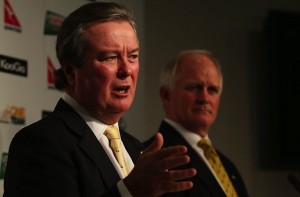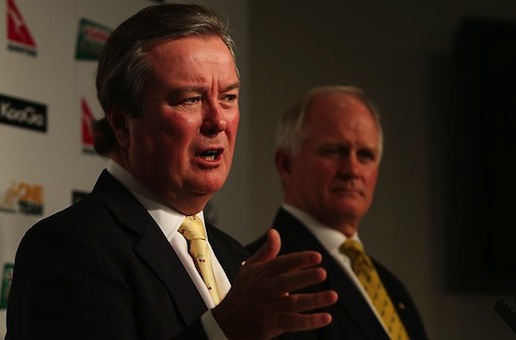Something had to give – and so it did. Last week John O’Neill (JO’N) stepped down as CEO of the ARU. After a combined 14 years at the helm, how do we judge this second term and what was its real downfall?

The Boardroom Behemoth
JO’N re-entered Australian rugby in financial freefall through a third tier competition haemorrhaging money and a Gobal Financial Crisis that had snapped sponsor chequebooks shut. The ex-banker in him quickly formulated a new approach: restructure the ARU cost base while enhancing Australia’s elite rugby offering through Super and International rugby.
Using his characteristic strengths in boardroom negotiation, JO’N pulled off some real coups within this strategy – grabbing a fifth franchise, elongating the Super Season, carving out a good share of the SANZAR TV rights while holding the weak hand and even getting a payout from the IRB for the impact of the 2011 World Cup on domestic tests. That he will continue to be the ARU delegate to the International Rugby Board and maintain his place on the board of Rugby World Cup Ltd plays exactly to his strengths.
We’ll see later this month whether another of his boardroom stoushes – this one on the governance of the ARU and the weight of power that state representatives have in it – comes off. If it does, it just may be his most important achievement for Australian Rugby, because while it is set to be riven by territorial self-interest true professional change cannot be effected.
Regardless, it frames a quality that I had always perceived in JO’N – of not being afraid to grasp the nettle and take the hard decision. Hell, look at the warzone he’s been fighting his way through over the bloodied boardroom floor of Echo in his ‘spare time’ during recent months!
The Wheels Wobble
Which brings me to what has been surely the most puzzling part of JO’N’s second tenure. A key part of his ‘elite rugby’ strategy has been the performance of the Wallabies. For the love and the money to trickle its way down, they need to shine. Step 1 was to get the very best head coach anyone could find, and no doubt at the start JO’N would have felt that landing Robbie Deans was another achievement like the ones listed above. I wonder at which stage JO’N felt that pit of the stomach sensation that it wasn’t going to plan?
For surely he could see that the only way in modern rugby for a team to truly challenge the hegemony of New Zealand was under the leadership of a man with the vision and the ability to lead a management team of experts to achieve excellence in every facet of the game.
Far from that, it turns out that Robbie Deans’ now well noted inability to run such a management team, or then communicate to players (it’s understood in a recent Wallabies team meeting he was called ‘The Riddler’ by an exasperated Wallaby) makes his transition from a successful provincial to a ground-breaking international head coach unlikely, if not impossible.
[As an aside: I read in disbelief over the weekend an article that claimed Deans being a “one man band” like Clive Woodward or Rod MacQueen was no bad thing. Neither of these men were “one man bands”, as Sir Clive explained to me on twitter
http://twitter.com/CliveWoodward/statuses/257124464268042240
MacQueen had Tim Lane, Jeff Miller and some guy called Ewen McKenzie among his assistants, coined “player power” and is to this day known more as a manager than a coach. It seems Spiro has confused strong leadership – from Woodward and MacQueen – with the inability to work with others from Deans.]
But putting “the soft stuff” to one side, for a man of balance sheets the yearly failing with regards to the self enforced hard measure of a Bledisloe series win – indeed the racking up of a record number of defeats at New Zealand’s hands – must have been impossible to ignore for O’Neill. Perhaps the winning of the Tri-Nations in 2011 papered over those cracks momentarily, but the Wallabies showing in the world cup – where they came second in their pool, scraped a quarters win and were slaughtered in the semi-final – could not be painted as anything other than falling short.
A decision not made
This is where JO’N’s second reign became unstuck.
We’d been asked to keep the faith and judge on the World Cup – and doing just that you could see the Wallabies were no closer to challenging the top spot. Giving Deans the time we’d allotted for change was right, but the experiment had run its course and failed.
What’s followed is nothing other than a botched mess: a hidden report that’s resulted in the full coaching team other than Deans going, player management debacles, more shock losses and a level of play that’s stultifying even the rugby faithful. I can only surmise that there is either some level of misplaced loyalty that has stopped O’Neill making the tough but right management decision in this situation – either that or a boardroom pact from which there was no escape.
Regardless of the reason, it’s clear that JO’N’s lustre for the role had ebbed. The two year contract extension was nothing more than insurance for O’Neill as he looked at fresh fields – first with Manchester City and now more successfully with Echo. Which has brought us to the final absurdity – the idea that John O’Neill must step down from the ARU “for no other reason” except that the other job he took on has become too much. Like it was an unavoidable accident over which he has no choice!
It is this logic gap that I cling to when I hear Michael Hawker give Deans “the full support of the board” – that the same ructions that made JO’N’s position untenable post Pretoria were the ones that created the muted coaches box in Rosario. Not for spite of Robbie Deans – who seems an honourable and decent man – but so that the Wallabies and Australian rugby can re-set their course with a bigger and braver vision, to get us back to where we know we can be.

